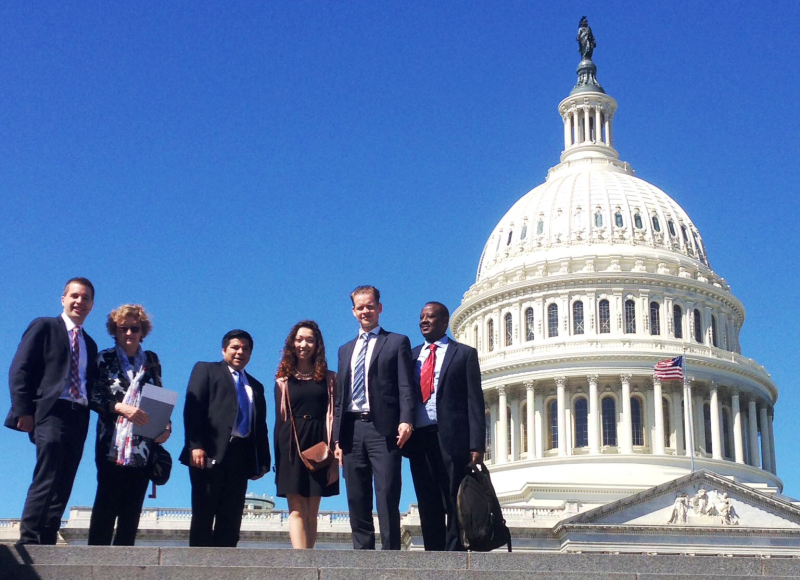Where We Work
See our interactive map


From left: Vince Blaser (director, Frontline Health Workers Coalition), Barbara Stilwell (senior director for health workforce solutions, IntraHealth International), Erick Zeballos (deputy director, International Labour Organization, Washington), Michelle Korte (Global Health Corps Fellow, IntraHealth International), Casper Edmonds (senior programme and operations officer, International Labour Organization), and Jean Damascène Butera (chief of party, Guinea, Abt Associates). Photo courtesy of the Frontline Health Workers Coalition.
As organizers of this awareness week, we’re often asked who we are and how we contribute.
As Maria Valenzuela wound down her story, she held up a necklace with the pebbles from all of the low-income communities in Phoenix she serves, telling the spellbound Capitol Hill crowd she has taken those communities and their voices with her to Washington DC.
Maria has been working as a community health worker for more than 20 years, and her story told at a Congressional Briefing on Wednesday illustrated the universality of impact that frontline health workers have, whether it be in her community in Phoenix or those in Latin America and Africa her organization Esperança serves.
Health workers like Maria deserve our honor, support, and advocacy every day.
Five years ago, members of the Frontline Health Workers Coalition (FHWC), which I’m proud to lead, wanted to dedicate a time every year to honor and celebrate health workers, and the first week of April around World Health Day seemed the perfect fit. We worked with the Global Health Workforce Network and the World Health Organization, and World Health Worker Week was born.
Health workers like Maria deserve our honor, our support, and our advocacy every day. This week is about them and the heroic work they do. But as organizers of this awareness week—we’re often asked who we are and how we contribute.
Last week’s Congressional Briefing is a perfect example of our work in action. With a new Congress and new Administration here in Washington, the onus looms large to inform policymakers of the tremendous impact frontline health workers have in saving millions of lives, ensuring security from infectious disease threats like Ebola, and enabling inclusive economic growth.
The briefing—sponsored by FHWC, IntraHealth International, and Abt Associates—and subsequent meetings with key Congressional offices aimed to do just that.
The impact and huge return on investment of frontline health workers is plainly evident to any regular reader of stories from our member organizations in FHWC’s blog. That evidence is crystalizing into global, country-led action to address the most acute health workforce gaps via global Workforce 2030 Strategy, and the developing 5-year Action Plan of the High-Level Commission on Health Workforce and Economic Growth. Jim Campbell of the World Health Organization and Casper Edmonds of the International Labour Organization strongly underscored the momentum and cross-sector work to make it happen at last week’s briefing.
Health workers must be at the center of policymakers' agendas.
The United States has played a decisive leadership role in the tremendous progress we’ve had in global health in the two decades.
Damas Butera of Abt Associates and Barbara Stillwell of IntraHealth beautifully illustrated US leadership and investment in action—whether it be battling and recovering from Ebola in Guinea, jump starting a midwifery training program to drive down the world’s worst maternal death ratio in Afghanistan, or empowering faculty at a nursing school in northern Mali, who later defiantly build back their school after it was razed during an extremist insurgency.
For these stories and that success to continue, robust leadership and investment from the United States to catalyze global action is simply a must. The people at the center of that progress—health workers on the frontlines of care like Maria—must also be the center of policymakers' agendas. Our recommendations for how the United States can do that utilizing existing investments are here.
As World Health Worker Week passes, the millions of frontline health workers will continue their heroic daily work. If we are to truly honor them, we must continue to tell our policy makers over and over #HealthWorkersCount.
For more on how to engage in World Health Worker Week and beyond, visit https://www.frontlinehealthworkers.org/worldhealthworkerweek/.
This post originally appeared on the Frontline Health Workers Coalition blog.
Get the latest updates from the blog and eNews




